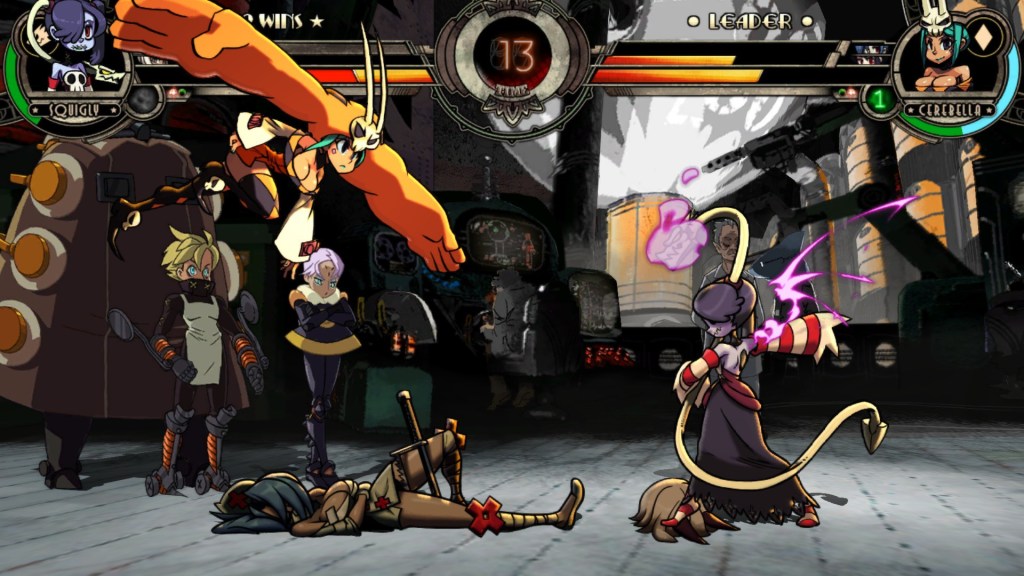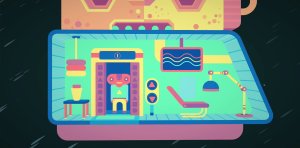Just a few weeks ago, the acclaimed developer of Skullgirls and Indivisible, Lab Zero Games, imploded in the wake of multiple waves of accusations against owner Mike “Mike Z” Zaimont, including allegations of inappropriate sexual comments and a toxic workplace. After a number of high-profile employees at Lab Zero quit in protest at a perceived lack of accountability and change, everyone else but Zaimont was unceremoniously laid off.
Rather than simply scatter to the winds in the middle of an ongoing pandemic, a group of 16 former employees of Lab Zero have decided to band together under a new banner called Future Club. Most importantly, Future Club is a fundamentally different and unique kind of game developer: it’s a worker-owned co-op, where there is shared power among employees.
Videos by VICE
“We really want this team to be rewarded for the efforts they’re putting in towards the game,” said designer Earl Gertwagen in a recent group interview with VICE Games. “We want everybody to feel they’re invested in the game and the quality of the product and the survival and sustainability of the team itself.”

The vast majority of the video game industry operates under the same business model, where one’s livelihood—the ability to pay a mortgage, have health insurance, provide for a family—is at the unknowable whim of powerful corporate owners whose day-to-day decisions are dictated by the winds of stockholders, instead of rewarding the labor of its workers. Some employees may qualify for bonuses, but basically nobody actively participates in the revenue generated by their work. Those profits go back to the owners.
It’s how a company like Activision can generate record revenue and lay off 800 employees without blinking an eye.
The vast majority of the video game industry is not unionized, and even among most small developers, where there is an opportunity for experimentation, most studios are traditionally organized. Co-ops are the exception, not the rule, which makes Future Club’s choice to be a co-op an important outlier. By organizing as a co-op from day one, it’s attempting to etch shared power into its DNA.
“We wanted to make sure that we could lay all the groundwork we need at the beginning,” said Future Club CEO and producer Francesca Esquenazi, “so that even though we’re starting fresh, we also we’re starting on a really good foot, to help potentially avoid a lot of the issues that we ran into before.”
Future Club will not, legally speaking, be seen by the U.S. government as a co-op. It is not uncommon for companies that try to internally operate like a co-op to follow the same path.
“We’ve spent the last couple weeks researching and talking to other developers with co-op studios,” said creative director Mariel Kinuko Cartwright, “and the overall impression we came away with was that an actual co-op corporation—as in the legal entity—is still relatively unknown and misunderstood outside of certain industries in the US. We found it hard to get a clear answer on certain things like getting group health insurance, since plans are generally built around the traditional corporate structure. But a corporation that functions as a co-op is still a co-op, and we’ll be making sure our company bylaws reflect those values.”
When Lab Zero was falling apart and people were leaving, the ex-employees started gathering on a private Discord server to keep in touch and have the experience of venting and wallowing in sadness that typically takes place at the bar down the street from the office. In many ways, it felt normal; COVID-19 meant they’d already worked remotely for months.
The idea of sticking together and forming a co-op came up pretty early, but ran into snag: no one had really done the research on what it means to put together a co-op. It’s something most people have probably heard of, but actually putting together a co-op was another story.
“I had very little knowledge of actual co-ops before we started really investigating,” said Cartwright. “But for me, it was like—well, we have overarching goals for what we want out of this company. We want it to be owned by the employees. We want all the employees to have a say. If those were our goals, what were the ways to make that happen?”
There are a handful of other co-ops currently operating, including Dead Cells developer Motion Twin and The Glory Society, a group formed, in part, by several developers who worked on Night in the Woods. I actually profiled one such developer, KO_OP, last year.
Esquenazi said Future Club has become part of what they jokingly called the “co-op summit,” where gaming co-ops from around the world get on a big Zoom call and talk about their experiences. This has proven valuable as Future Club figures out the finer details.
That’s because the finer details matter a lot. You’ll notice the employees of Future Club still have titles, which means they have specializations. Cartwright is a creative director, Esquenazi is a producer and the CEO, Gertwagen is a designer. Sharing ownership does not mean Future Club is entering a world where each person is signing off on every decision.
“There’s this misconception [of] ‘how can you make decisions when everyone is equal?’” said Esquenazi.
Future Club will have roles, and while the input of everyone is welcome, certain people will be assigned to writing code, designing levels, producing art, etc. The studio will also have a board of directors whose members are voted on by the employees, and the board is tasked with making the kinds of major decisions that do not necessarily require everyone’s input.
“Since the board is elected by the employees,” said Cartwright, “the employees also have the ability to call for another vote and say, ‘Hey, maybe we need to discuss the board. I’m not sure if I agree with where this has been going.’ They can invite a conversation with everyone.”
Some co-ops pay every employee the same salary, but Future Club is likely to do something different, based on seniority and experience. This confronts an issue co-ops run into, as people’s situations are often different. Someone with two kids, for example, will need more money than someone who does not. The studio’s rules haven’t been completely laid out yet, but Esquenazi said they “will try to be as fair as possible” and all salaries will be transparent.
“We need to have money first, before we can pay people,” laughed Esquenazi. “We’re working on that.”
Where that money comes from is yet to be determined; Future Club is still figuring out its identity and internal culture. The owner of the Skullgirls IP and the company that handles the mobile version of Skullgirls has already publicly committed to cutting ties with Lab Zero and promising to provide work to its now ex-employees, but the dust is still settling in that regard.
The hope, though, is that having gone through the gauntlet at Lab Zero has provided Future Club with the lesson on what not to do. That’s the foundational ethos of their new company.
“I still feel pretty confident that it’s really the best choice for our team,” said Esquenazi.
Follow Patrick on Twitter. His email is patrick.klepek@vice.com, and available privately on Signal (224-707-1561).
More
From VICE
-

(Photo by Frederick M. Brown/Getty Images) -

(Photo by Kristy Sparow/Getty Images) -

Tension Movies/YouTube



